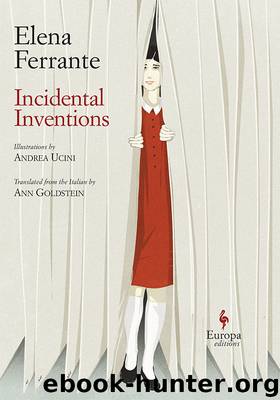Incidental Inventions by Elena Ferrante

Author:Elena Ferrante
Language: eng
Format: epub
Publisher: Europa Editions
Published: 2019-10-20T16:00:00+00:00
Literary Novelty
21 July 2018
There was a phase—fortunately long past—when I was convinced that a story either had to be absolutely new, comparable to nothing but itself, or it must be discarded. This was a very presumptuous and at the same time naive attitude. It assumed that I was endowed with extraordinary gifts, and that if these gifts were not manifested in works of utter, precious uniqueness, I would have to conclude either that I was betraying myself, out of laziness or sloppiness, or that my assumption was completely unfounded. In other words, what I wrote had to be better than, and at the same time completely different from, the books that I loved and that had inspired my yearning to tell stories.
Today, I don’t have much faith in those who say, “Here is a truly new book.” What is truly new in literature is only our uniquely individual way of using the storehouse of the world’s literature. We are immersed in what has preceded us. I don’t mean the schoolbooks that chronologically order authors, their lives and works, from the beginning to now, nor do I mean the meticulous list of what we have read, starting from the age of seven. There is no before of which we are the after. All literature, great or small, is in that sense contemporary: it crowds around us as we write; it’s the air we breathe.
Consequently, our pages are never “new” in the sense that the culture industry gives the adjective. No author produces texts without debts. There are no works that make a clean break with the past, works that exclude it—no truly watershed works. Literary novelty—if one wants to insist on the concept—exists in the way each individual inhabits the magma of forms he is immersed in. Thus “to be oneself” is an arduous task—perhaps impossible.
Being oneself does not mean being “new.” I’m surprised by those who provocatively flaunt their own “novelty,” who consider themselves unique, who don’t want to admit influences. It’s a spectacular exhibition of arrogance, for the use of the media; or a manifestation of the terror of not having any individuality—as if it could be proved only by denying the literary material that has established and establishes us. Not even Homer was ever “new.”
The individual author takes shape every time, thanks to the effort of deconstructing the literary tradition and putting it back together in startling forms. And that’s not at all a small thing.
Download
This site does not store any files on its server. We only index and link to content provided by other sites. Please contact the content providers to delete copyright contents if any and email us, we'll remove relevant links or contents immediately.
| Diaries & Journals | Essays |
| Letters | Speeches |
The Rules Do Not Apply by Ariel Levy(4969)
Bluets by Maggie Nelson(4556)
Too Much and Not the Mood by Durga Chew-Bose(4348)
Pre-Suasion: A Revolutionary Way to Influence and Persuade by Robert Cialdini(4232)
The Motorcycle Diaries by Ernesto Che Guevara(4101)
Walking by Henry David Thoreau(3962)
Schaum's Quick Guide to Writing Great Short Stories by Margaret Lucke(3381)
The Daily Stoic by Holiday Ryan & Hanselman Stephen(3322)
What If This Were Enough? by Heather Havrilesky(3311)
The Day I Stopped Drinking Milk by Sudha Murty(3197)
The Social Psychology of Inequality by Unknown(3031)
Why I Write by George Orwell(2954)
Letters From a Stoic by Seneca(2799)
A Short History of Nearly Everything by Bryson Bill(2698)
A Burst of Light by Audre Lorde(2607)
Insomniac City by Bill Hayes(2558)
Feel Free by Zadie Smith(2481)
Upstream by Mary Oliver(2390)
Miami by Joan Didion(2368)
